Homepage / University / Disability and individual needs
Disability and individual needs
The priority of Mykolas Romeris University is an open and flexible study environment adapted to all students with disabilities or individual needs.
The University pays a lot of attention to:
- discussing disabilities or individual needs during confidential consultations
- adaptation of study conditions to every student with a disability or individual needs
- improvement and adaptation of the study environment for students with disabilities or individual needs
- informing students with disabilities or individual needs about financial support
If you have questions, please feel free to contact us:
Personnel Performance Office, Anželika Vėžienė, E-mail: anzelika.veziene@mruni.eu
Through the activities of the Psychological Support operating at the University, the mental health and well-being of students and employees is improved, and free consultations are provided.
Academic Affairs Centre is responsible for individualized organization of studies taking into account the information provided to the University by students with special needs and the specific personal needs expressed.
Common Areas of the University Tailored to Your Needs
The central building of the University is perfectly tailored to meet requirements of persons with special needs – there is a parking lot next to the University to park cars. The entrances to the University are equipped with ramps, which automatically open the entrance door of the building. A person in a wheelchair can enter the building independently without the help of others. Lifts are installed in the Central building and the adjoining building. The 4-story building has an elevator for easy movement between the floors. There are no obstacles to moving around within the University – auditoriums, conference halls, library reading rooms, toilets (adapted to the needs of persons with special needs on the second, third and fourth floors of the building) and also other places accessible by wheelchair that can be reached independently.
The Library
The MRU Library is well-equipped and adapted for persons with special needs – it is equipped with lifts that help those in wheelchairs to easily get to reading rooms and other Library premises. Using compensatory equipment for persons with special needs, computerized workplaces have been set up on the lower level of the Library. Those who are visually impaired can use workplaces equipped with the stationary electronic image magnifier TOPAZ XL XD 24, which has artificial lighting and a video camera that allows you to enlarge the text on the screen to the required size, to select the right color combination and adjust the required contrast. This machine magnifies the readable text from 2 to 50 times.
The availability of services for people who cannot read plain text is increased by participating in the project, “MoBiLait: Opening Learning Opportunities for People Who Can Not Read Plain Printed Text Through the Lithuanian Library Network,” which is coordinated by the Lithuanian Library for the Blind (LAB). Information services for persons with special needs are organized and publications necessary for self-education and studies are provided.
The University Library’s Grand Reading Room (Room I-04) has 6 work stations (2 of which are computerized) for users with visual and mobility impairments:
- specialized ergonomic chair with height adjustment of armrests, vertical tilt, support tilt angle;
- specialized height-adjustable table;
- 3 specialized height-adjustable push-in and angle tables;
- Braille printer BRAILLE EMBOSSER EVEREST-D V4 with acoustic cabinet;
- TOPAX XL XD 24 stationary electronic image magnifier for on-screen display enlarged written or printed text.
Workplaces have:
- JAWS 14 for Windows – software that analyzes information on the screen and transmits it to a speech synthesizer that converts text to audio;
- Win Taker Voice 1.6 – a program that transmits information on the computer screen to a user in Lithuanian language;
- SuperNova Magnifier 13.03 – a program for enlarging all or part of the information displayed on the computer screen.
- Readers can also use the electronic Braille device E-SYS 1.04.
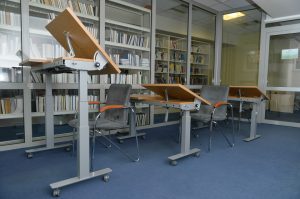
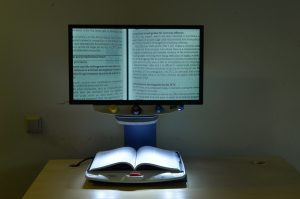
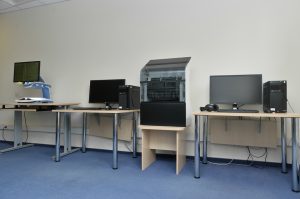
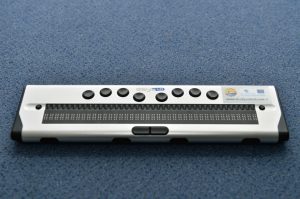
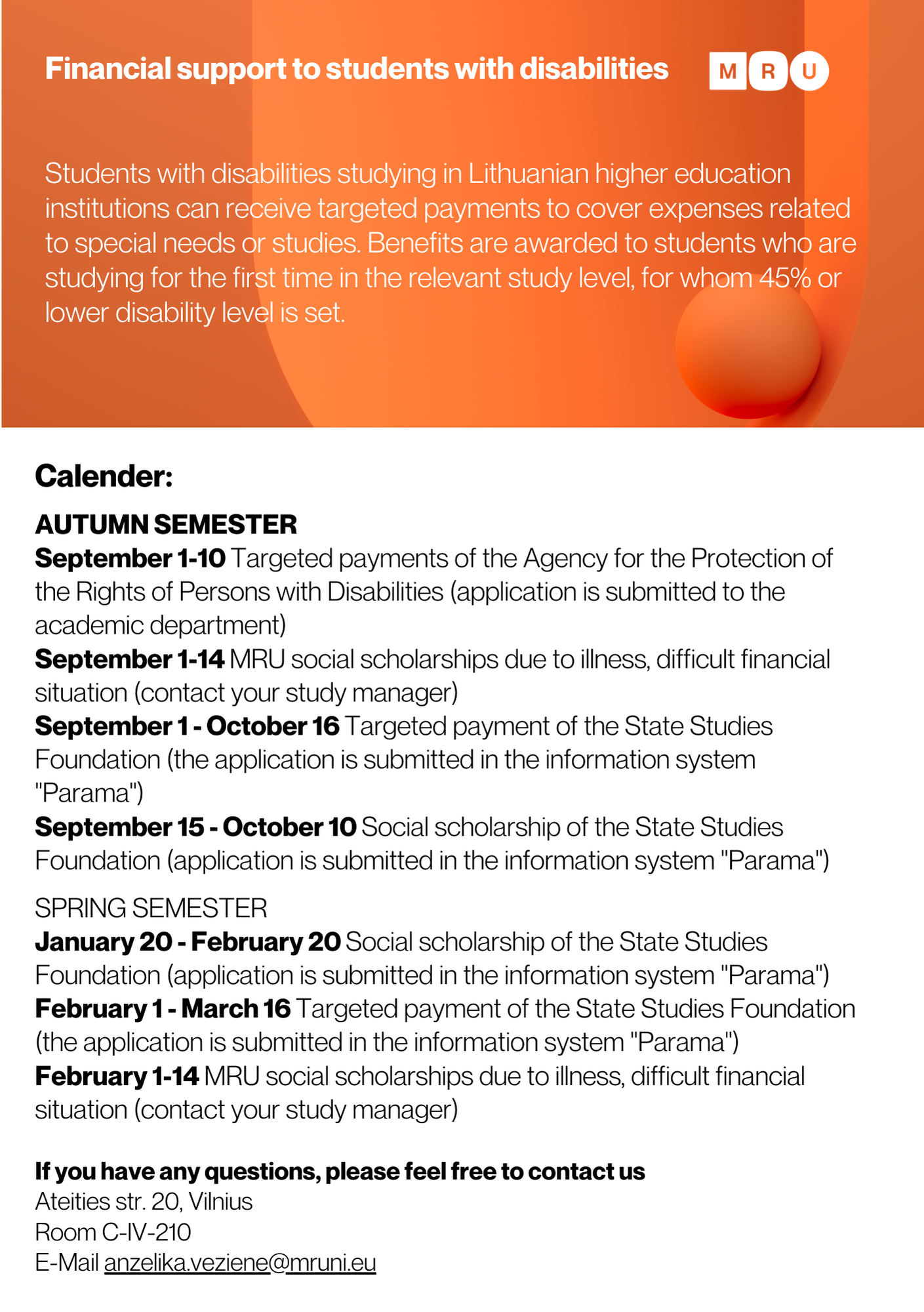
TARGETED PAYMENTS OF THE AGENCY FOR THE PROTECTION OF THE RIGHTS OF PERSONS WITH DISABILITIES
Students studying in an institution of higher education in Lithuania with special needs can receive specific payouts to cover expenses relating to special needs (134,88 Eur) and studies (176,00 Eur). The payouts are for students in a specific studies cycle studying for the first time who have a 45% or less level of working capacity.
Contact please your study manager.
FINANCIAL SUPPORT OF THE STATE STUDIES FOUNDATION
Social scholarship
The State Studies Foundation social scholarship (357,50 Eur/month) can be awarded to students of all institutions of higher education in 1st, 2nd, 3rd cycles of studies, full-time or professional studies students who have a level of working capacity of 45% or less or a severe or moderate level of disability determined in accordance with the procedure established by legal acts.
Contact please: the State Studies Foundation
ERASMUS+ AND DISABILITY
Additional financial aid for selected students for Erasmus+ studies or a traineeship abroad. Students who have participated in the competition and are selected to go on an Erasmus + study or traineeship abroad have the opportunity to receive additional funding to cover the costs related to their disability or special needs during their Erasmus + traineeship or study abroad. The application for additional support is submitted to the Education Exchange Support Fund no later than 1 month before departure.
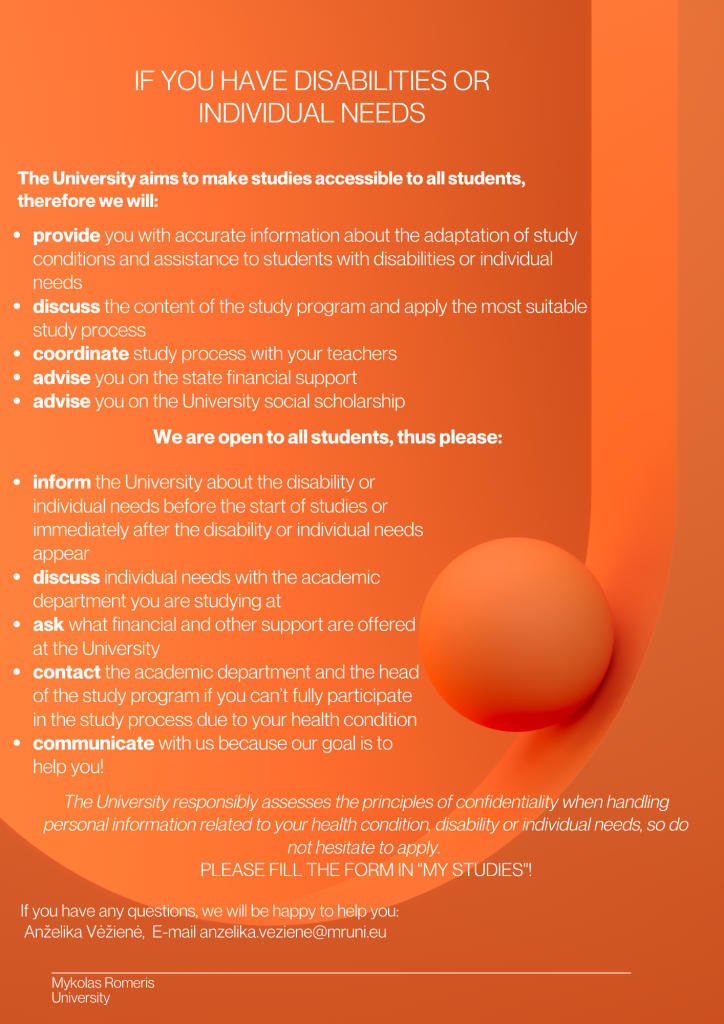
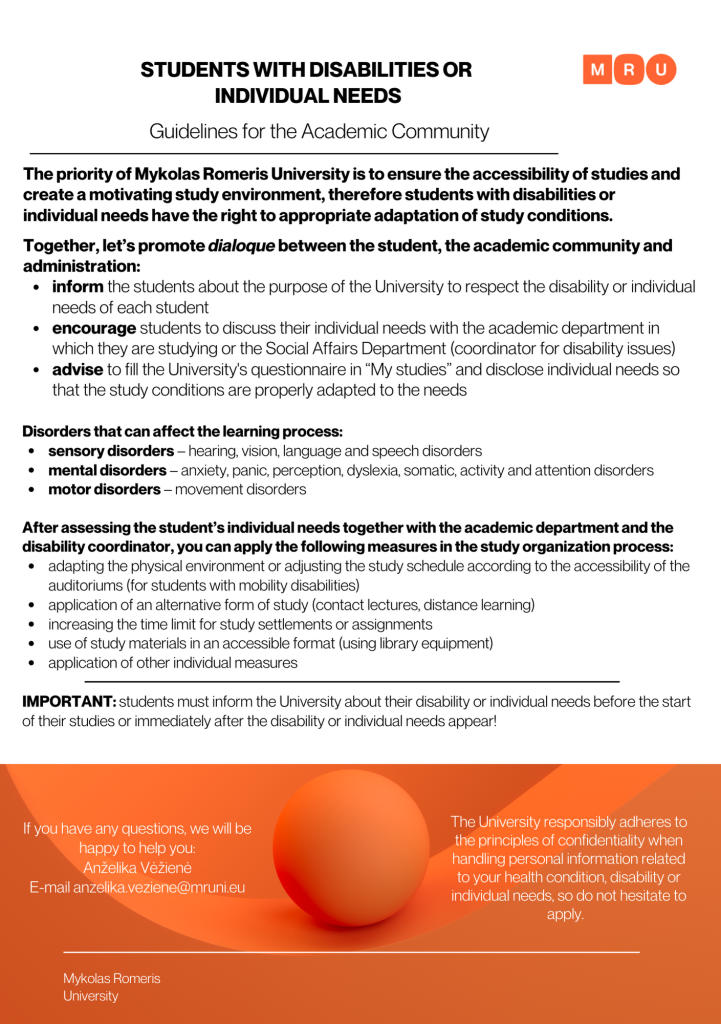
Disorders That Can Affect the Learning Process
Sensory disorders are disorders of hearing, vision, language and speech that interfere with the reception of information through sensory organs.
Hearing impairment is a complete or limited inability to receive sound information, and visual impairment is a complete or partial inability to receive visual information.
Hearing impairment often occurs together with language impairment – total or partial inability to understand speech. A speech disorder includes the inability to understand the language system, impaired language development, writing disorders, etc., and speech disorders are characterized by abnormal speech rates (rapid speaking, slow speech) and signs of voice loss or weakness.
Mental disorders are complex disorders that affect brain function, thinking, perception, communication, feelings and daily activities. This group of disorders includes anxiety and panic, perception, dyslexia, somatic, activity and attention disorders.
A panic attack is a spontaneous, intense attack of anxiety lasting less than one hour. During a panic attack, you feel chest pain, difficulty breathing, faster pulse, nausea or dizziness, increased blood pressure, fear of death, shaking hands etc.
Anxiety disorder – a constant feeling of anxiety for no apparent reason – is accompanied by disturbed sleep, irritability, rapid fatigue, impaired concentration and other similar symptoms.
Activation and attention disorders are characterized by memory impairment, hyperactivity, distractibility, irritability, inattention, and impulsivity.
Dyslexia is a specific reading, writing or pronunciation disorder characterized by a deterioration in memory and concentration. Individuals with dyslexia may have difficulty reading and may have speech or language development disorders.
Perception disorder – a disorder caused by mental illness, damage to the central nervous system or drug addiction, characterized by non-recognition or distortion of environmental elements or sounds, false perception of phenomena (illusions, hallucinations).
Somatic disorder – a disorder characterized by frequently changing, multiple somatic symptoms, when a person feels pain of psychological origin. The disorder is characterized by illness seeking, anxiety, depression, constant complaints of ailments.
Motor disorders are a limited ability of a person to move, control the movements of arms or legs.
The Department for the Affairs of the Disabled under the Ministry of Social Security and Labour
If you have any question, we will be happy to help you:
Anželika Vėžienė
Personnel Performance Office, C-IV-210
Tel. +370 5 271 4644
E-mail: anzelika.veziene@mruni.eu
For questions on financial matters contact:
Kazė Vaškelytė
Finance Office Accountant
Office: C-V-028
Tel. +370 5 271 4577
E-mail: kvaskelyte@mruni.eu